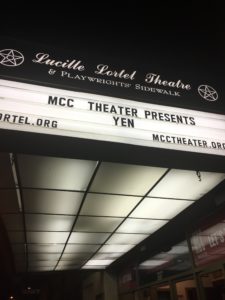I have a confession to make. I have a weakness for British social realism plays. Give me council housing, East London accents, over-consumption of Tango and Smirnoff Ice, and I’m in Heaven.
Anna Jordan’s Yen – currently playing at Lucille Lortel and produced by MCC – fits perfectly in my wheelhouse. Like all such plays that share DNA with John Osborne’s Look Back in Anger, Yen chronicles the hard poverty that a not insignificant percentage of Britain’s urban population. What sets it apart, though, is a that it is just a socio-economic investigation but a moral indictment as well.
Teenager half-brothers Hench (Lucas Hedges of Manchester on the Sea) and Bobbie (Justice Smith from The Get Down) live alone in a desolate flat with only one t-shirt to share between them. They take care of – in the loosest sense of the term – Taliban, their German shepherd. Their mother Maggie (Ari Graynor) has buggered off to live with a new boyfriend. Into their lives wanders Jennifer, or Yen (Stefanie LaVie Owen), newly arrived from Wales. She tries to bring care and human affection to the boys and the dog. At first, she seems to have a positive effect on their lives, but inevitably it all goes terribly wrong and damaged people become even more (physically and emotionally) damaged.
Jordan’s work is unique for several reasons. First, sudden care after years of, well, not abuse necessarily but certainly neglect does not automatically create a positive trajectory toward reassimiliation into society. It is just as likely to create divisions, misunderstandings, and even rage. Second, both brothers are troubled to some degree or another, though Bobbie more so. They do not have the language to express their state of being. Even as Bobbie gets swept up by the Crown’s judicial system, Hench is still left hanging without a clear path to something, anything better. When he seeks out Yen at the end of the play, after all the pain she has had to endure, he desperately needs to tell her something. In an American play, this would result in a beautiful monologue where the damaged hero would tell a story that would crystallize his self-awareness and lead him down the road of recovery and redemption. Not so here. His monologue is a tangle of words and images that distills nothing. Brilliant. Third, Maggie realizes that she has failed as a mother as she sits with Bobbie at the end of the play, but in the same moment, she also realizes that she does not possess the tools to be a better mother. Progress perhaps, but only measured in millimeters.
And that leads to the new terrain Jordan treads. Yes, conditions in council housing, or projects, are bad. That is easily agreed. Here is where she pierces the heart. It is already too late, she seems to be saying. For teenagers like Hench and Bobbie, they are already past saving. It is not enough to try and salvage a bad situation. It is a moral imperative not to let that bad situation occur in the first place or there will be no escape generation after generation.
The acting is exceptional. Owen is both a tough and vulnerable Yen. Graynor is both comic and tragic, monstrous and despairing in equal measure. It catches one unaware, but her journey over the course of the play is immense and organic. Smith and Hedges both play against their more famous screen personas. Smith successfully rides the roller coaster of volatile emotions and maturity. Hedges — who has been carving a niche for himself in indie film working with such directors as Wes Anderson, Terry Gilliam, and Kenneth Lonergan – proves he has the chops to be one of our country’s great actors in the Philip Seymour Hoffman/Michael Shannon vein. His silences are filled with a wounded intensity, his line readings underscored by emotional complexity, and his sense of character revelatory.
For American audiences used to closure and the conclusion of their dramas, Yen is not always easy, but ultimately that is what makes it such a rewarding and necessary evening of theatre.





